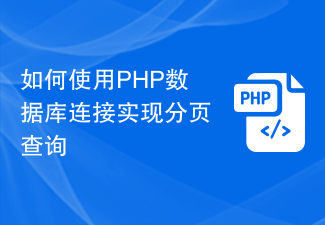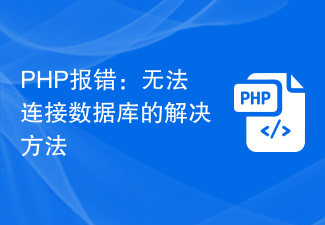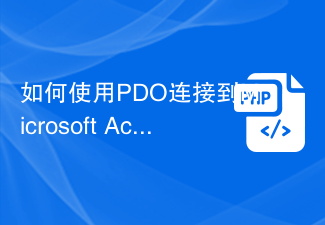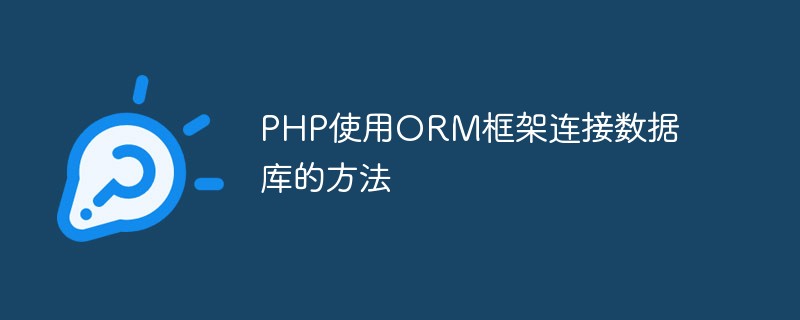
"What databases does the Go language support? 》
Go language is a simple and powerful programming language with rich database support. In the Go language, developers can use various types of databases, including relational databases, NoSQL databases, and in-memory databases. This article will introduce some common databases supported by the Go language and provide some specific code examples.
1. MySQL
MySQL is a common relational database that is widely used in web development. In the Go language, we can use third-party libraries to connect to the MySQL database and execute SQL queries. The following is a simple sample code:
package main
import (
"database/sql"
"fmt"
_ "github.com/go-sql-driver/mysql"
)
func main() {
db, err := sql.Open("mysql", "username:password@tcp(127.0.0.1:3306)/database_name")
if err != nil {
panic(err.Error())
}
defer db.Close()
// 查询数据
rows, err := db.Query("SELECT * FROM users")
if err != nil {
panic(err.Error())
}
defer rows.Close()
// 遍历结果集
for rows.Next() {
var id int
var name string
err = rows.Scan(&id, &name)
if err != nil {
panic(err.Error())
}
fmt.Printf("ID: %d, Name: %s
", id, name)
}
}2. MongoDB
MongoDB is a popular NoSQL database suitable for processing large amounts of unstructured data. In the Go language, you can use the officially provided MongoDB driver to connect and operate the MongoDB database. The following is a simple sample code:
package main
import (
"context"
"fmt"
"go.mongodb.org/mongo-driver/mongo"
"go.mongodb.org/mongo-driver/mongo/options"
)
func main() {
clientOptions := options.Client().ApplyURI("mongodb://localhost:27017")
client, err := mongo.Connect(context.Background(), clientOptions)
if err != nil {
panic(err.Error())
}
defer client.Disconnect(context.Background())
collection := client.Database("test").Collection("users")
// 插入数据
_, err = collection.InsertOne(context.Background(), bson.D{
{"name", "Alice"},
{"age", 30},
})
if err != nil {
panic(err.Error())
}
// 查询数据
cursor, err := collection.Find(context.Background(), bson.D{})
if err != nil {
panic(err.Error())
}
defer cursor.Close(context.Background())
for cursor.Next(context.Background()) {
var result bson.M
err := cursor.Decode(&result)
if err != nil {
panic(err.Error())
}
fmt.Println(result)
}
}The above is a simple sample code for connecting MySQL and MongoDB databases in Go language. In addition, Go language also supports databases such as Redis, SQLite, PostgreSQL, etc. Developers can choose the appropriate database for development according to their own needs. With these database supports, developers can easily build various types of applications to meet different business needs.
The above is the detailed content of What databases does Go language support?. For more information, please follow other related articles on the PHP Chinese website!
 如何在FastAPI中实现数据库连接和事务处理Jul 30, 2023 am 11:45 AM
如何在FastAPI中实现数据库连接和事务处理Jul 30, 2023 am 11:45 AM如何在FastAPI中实现数据库连接和事务处理引言:随着Web应用程序的快速发展,数据库连接和事务处理成为了一个非常重要的主题。FastAPI是一个高性能的PythonWeb框架,因其快速和易于使用而受到开发者的喜爱。在本文中,我们将介绍如何在FastAPI中实现数据库连接和事务处理,以帮助您构建可靠和高效的Web应用程序。第一部分:数据库连接在FastA
 如何使用PHP数据库连接实现分页查询Sep 08, 2023 pm 02:28 PM
如何使用PHP数据库连接实现分页查询Sep 08, 2023 pm 02:28 PM如何使用PHP数据库连接实现分页查询在开发web应用中,常常会涉及到对数据库进行查询并进行分页显示的需求。PHP作为一种常用的服务端脚本语言,具备强大的数据库连接功能,可以很方便地实现分页查询。本文将详细介绍如何使用PHP数据库连接实现分页查询,并附上相应的代码示例。准备数据库在开始之前,我们需要准备一个数据库,包含要查询的数据。这里以MySQL数据库为例,
 PHP报错:无法连接数据库的解决方法Jul 12, 2023 pm 06:07 PM
PHP报错:无法连接数据库的解决方法Jul 12, 2023 pm 06:07 PMPHP报错:无法连接数据库的解决方法在使用PHP开发过程中,经常会遇到无法连接数据库的问题。这是非常常见的错误,但是却给开发人员带来不小的困扰。本文将介绍一些常见的解决方法,并提供相应的代码示例,帮助开发人员快速解决该问题。检查数据库连接信息首先,应该检查数据库连接信息是否正确。通常,数据库连接信息包括主机名、用户名、密码和数据库名。正确无误的数据库连接信息
 如何连接和操作数据库以及处理SQL查询Aug 02, 2023 am 09:06 AM
如何连接和操作数据库以及处理SQL查询Aug 02, 2023 am 09:06 AM如何连接和操作数据库以及处理SQL查询在开发应用程序的过程中,数据库连接和操作是非常重要的一部分。数据库是存储和管理数据的重要工具,而SQL(StructuredQueryLanguage)是用于查询和操作数据库的标准语言。在本文中,我们将学习如何连接和操作数据库,并展示一些处理SQL查询的代码示例。连接数据库:首先,我们需要连接到数据库才能进行
 如何使用PDO连接到Microsoft Access数据库Jul 29, 2023 pm 10:17 PM
如何使用PDO连接到Microsoft Access数据库Jul 29, 2023 pm 10:17 PM如何使用PDO连接到MicrosoftAccess数据库MicrosoftAccess是一款常用的关系数据库管理系统,它提供了用户友好的图形化界面和强大的数据管理功能。对于许多开发人员而言,使用PHP来连接到MicrosoftAccess数据库是个挑战。然而,通过使用PHP的PDO(PHPDataObject)扩展,连接到Access数据库变得相
 PHP使用ORM框架连接数据库的方法May 15, 2023 pm 09:51 PM
PHP使用ORM框架连接数据库的方法May 15, 2023 pm 09:51 PMPHP使用ORM框架连接数据库的方法ORM(Object-RelationalMapping)框架是一种将对象模型和关系型数据库模型进行映射的技术。它可以让开发者使用对象的方式来操作数据库,从而避免了手写SQL语句的繁琐和容易出错的问题。ORM框架在PHP中使用广泛,如Laravel的EloquentORM、Symfony的DoctrineORM等。在
 如何优化PHP的数据库连接和查询性能?Jun 29, 2023 am 10:25 AM
如何优化PHP的数据库连接和查询性能?Jun 29, 2023 am 10:25 AM如何优化PHP的数据库连接和查询性能?数据库是Web开发中不可或缺的一部分,而PHP作为一种广泛使用的服务器端脚本语言,其与数据库的连接和查询性能对于整个系统的性能至关重要。本文将介绍一些优化PHP数据库连接和查询性能的技巧和建议。使用持久化连接:在PHP中,每次执行数据库查询时都会建立一次数据库连接。而持久化连接可以在多次查询中重用同一个数据库连接,从而减
 Java代码Web开发问题的解决方案是什么?Jun 30, 2023 pm 09:58 PM
Java代码Web开发问题的解决方案是什么?Jun 30, 2023 pm 09:58 PM如何解决Java中遇到的Web开发问题在Java的Web开发过程中,我们常常会遇到一些代码问题,这些问题可能会导致程序无法正常运行,甚至会影响系统的性能和安全性。为了有效地解决这些问题,我们需要深入了解Java的特性和常见的Web开发问题,并学会使用相应的技术和工具来解决它们。一、Java中常见的Web开发问题内存泄漏:在Java的Web开发中,内存泄漏是一


Hot AI Tools

Undresser.AI Undress
AI-powered app for creating realistic nude photos

AI Clothes Remover
Online AI tool for removing clothes from photos.

Undress AI Tool
Undress images for free

Clothoff.io
AI clothes remover

AI Hentai Generator
Generate AI Hentai for free.

Hot Article

Hot Tools

Dreamweaver CS6
Visual web development tools

DVWA
Damn Vulnerable Web App (DVWA) is a PHP/MySQL web application that is very vulnerable. Its main goals are to be an aid for security professionals to test their skills and tools in a legal environment, to help web developers better understand the process of securing web applications, and to help teachers/students teach/learn in a classroom environment Web application security. The goal of DVWA is to practice some of the most common web vulnerabilities through a simple and straightforward interface, with varying degrees of difficulty. Please note that this software

WebStorm Mac version
Useful JavaScript development tools

Atom editor mac version download
The most popular open source editor

MinGW - Minimalist GNU for Windows
This project is in the process of being migrated to osdn.net/projects/mingw, you can continue to follow us there. MinGW: A native Windows port of the GNU Compiler Collection (GCC), freely distributable import libraries and header files for building native Windows applications; includes extensions to the MSVC runtime to support C99 functionality. All MinGW software can run on 64-bit Windows platforms.






